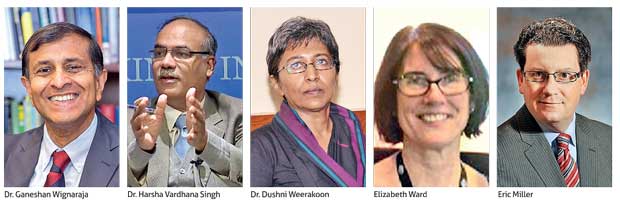Reply To:
Name - Reply Comment
Last Updated : 2024-04-26 02:12:00
BY CCC Economic Intelligence Unit
At the recently held ‘Sri Lanka Economic Summit 2017’, Sri Lankan and international speakers shared their views and recommendations on Sri Lanka’s trade reform efforts and the direction it should take, under the theme of ‘Executing a Smarter Trade Strategy Amidst Turbulence’. In this article, we capture the insights shared by these experts.
 Some of the key themes that were explored were, whether the anti-globalisation rhetoric is a real threat, what is the smarter way for Sri Lanka to plan out its forward march towards liberalisation and trade integration and how can Sri Lanka latch on to the growth in Asia, using the Association of Southeast Asian Nations (ASEAN) as a pivot.
Some of the key themes that were explored were, whether the anti-globalisation rhetoric is a real threat, what is the smarter way for Sri Lanka to plan out its forward march towards liberalisation and trade integration and how can Sri Lanka latch on to the growth in Asia, using the Association of Southeast Asian Nations (ASEAN) as a pivot.
The session started off with presentations by Lakshman Kadirgamar Institute of International Relations and Strategic Studies Global Economy Programme Chair Dr. Ganeshan Wignaraja and Brookings India Executive Director Dr. Harsha Vardhana Singh. The duo’s presentations were followed by a panel discussion with the participation of Institute of Policy Studies Deputy Director Dr. Dushni Weerakoon, Australia Foreign Affairs and Trade Department Trade Negotiations Office Special Negotiator Elizabeth Ward and USA Rideau Potomac President and Founder Eric Miller. Ceylon Chamber of Commerce (CCC) Chief Economist Anushka Wijesinha moderated the session.

1. Strengthen negotiation structure
The speakers acknowledged that trade agreements are powerful mediums of pushing forward trade liberalization and encouraging foreign direct investments (FDIs). Talks are currently underway on comprehensive trade agreements with India, China and Singapore. But Dr. Wignaraja argued these negotiations would take time since Sri Lanka’s current narrow trade negotiation structure is a constraint. He called for broadening the trade negotiation structure to allow Sri Lanka to quicken proper decision-making. He recommended that Sri Lanka should assemble a dedicated team of negotiators consisting of economists, lawyers and experienced trade negotiators to fast-track the process of trade negotiations.
2. Don’t cast FTA net too wide, cast it strategically
Dr. Weerakoon observed that the thrust seems to be right in pursuing FTAs with India, China and Singapore but it should be noted that FTAs are magnets for rallying opposition to free trade. Therefore, it is strategic to have a mix of bilateral and unilateral reforms, to allow us to pace and sequence our trade liberalization strategy in a way we can gain tangible benefits out of it. She also added Sri Lanka is missing a road map to economic integration and needs this urgently. She remarked, “Not knowing where the end point is will lead to bilateral negotiations with a large group of countries, which will result in multiple tariff schedules, which are disrupting to an economy.” Echoing similar sentiments, Miller advised Sri Lanka that it is vital to understand where one’s interest lies and forge trade pacts accordingly. He quipped, “FTAs are human creations based on deeper understanding of goals and not merely magical accords that deliver benefits out of the sky.” Weerakoon argued that our trade policies should be strategic in order to enhance economic growth and development.
3. Deepen domestic policy reforms
There is a growing consensus that structural reforms are needed to achieve robust and sustainable growth and to foster convergence to higher income levels. The panellists acknowledged that the success of the ongoing trade negotiations would also depend on the effective implementation of required reforms. Therefore, the country needs to urgently address domestic reforms by deepening domestic structural reforms in policymaking, covering the entire complexity of internal and external factors. This will attract FDIs into the country and implement efficacious trade agreements. As Ward argued, “The countries that stand to gain the most in the current trading climate are those who have made commitments for deepest domestic reforms.” Dr. Singh recommended using the Trans–Pacific Partnership (TPP) as a guiding framework for these domestic policy reforms. Both he and Ward believe that the TPP-type model acts as a catalyst for domestic reforms, delivering cutting-edge trade policies to contemporary economic settings, unlike FTAs. Ward added, “It’s a great opportunity for other countries to look at what is being done in that kind of an agreement and to
take from it.”
4. Latch on to Asia using RCEP and ASEAN
A closer look at the composition of the export basket in Sri Lanka highlights the fact that we are still struggling to break into Asia. As pointed out by Dr. Wignaraja, not trading with the most dynamic part in the world “is potentially challenging and significantly harmful”, as countries trade with their nearest geographical neighbours to gain from cost efficiencies associated with distance. Therefore, we need to proactively extend our export market to the ASEAN region in order to latch on to the growth in Asia, using ASEAN as a pivot. The FTA negotiations with Singapore, which are currently underway, will pave the way to obtain access to the Regional Comprehensive Economic Partnership (RCEP). His view is that given the RCEP’s low ambition on goods and services and easier adjustment terms, it will be highly beneficial to the Sri Lankan economy as a whole. Wignaraja argued that Sri Lanka must also be proactive in applying for observer status in ASEAN. He stated, “We should emphasis this thrust in our commercial diplomacy and our foreign mission in Indonesia should be given the explicit mandate to enhance dialog with ASEAN.”
(This article is part of the CCC’s ‘Trade Intelligence for the Private Sector’ (TIPS) initiative, where we bring diverse insights into national and global trade policy issues. Write to eiu@chamber.lk to engage. Visit www.economy.lk to catch up on videos of the ‘Sri Lanka Economic Summit’, including the full proceedings of this trade policy session)

Add comment
Comments will be edited (grammar, spelling and slang) and authorized at the discretion of Daily Mirror online. The website also has the right not to publish selected comments.
Reply To:
Name - Reply Comment
US authorities are currently reviewing the manifest of every cargo aboard MV
On March 26, a couple arriving from Thailand was arrested with 88 live animal
According to villagers from Naula-Moragolla out of 105 families 80 can afford
Is the situation in Sri Lanka so grim that locals harbour hope that they coul